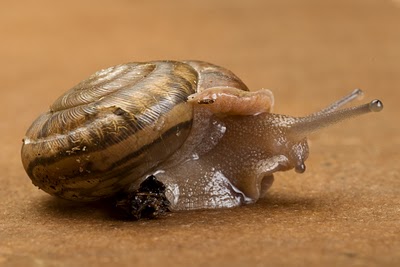Domain Eukaryota- The Domain Eukaryota consists of any celled
organism that possesses a clearly defined nucleus
(Encyclopedia Britannica, 2012). Britannica also lists these characteristics as being
unique to this domain: a nuclear membrane that surrounds the
nucleus, chromosomes in the nucleus, mitochondria, golgi
apparatus and an endoplasmic reticulum.
Kingdom Animalia- Kingdom Animalia is shortly defined as
multicellular Eukaryotic heterotrophs (schoolworkhelper, 2012). Heterotrophic means they do not produce their own food
and therefore must consume it.
Phylum Mollusca- Mollusca literally means soft bodied
(Encyclopedia Britannica, 2012). The Phylum Mollusca consists of any soft bodied
invertebrate, usually with a calcium bicarbonate shell
(Encyclopedia Britannica, 2012).
Class Gastropoda-Let’s break-down the word Gastropoda into its
Greek roots; first we have “gaster” which means stomach, next is
“pous, or podos” which translates to foot (Hickman et al.,
2012). If we were to call this class of organisms by its translated name, we would
say Class Stomach-foot. Hickman and his associates also tell us that this class
is the largest, encompassing 70,000 living species. These species include; snails, limpets, slugs, whelks,
conchs, periwinkles, sea slugs and more. The key difference separating Gastropods from other
classes in Mollusca, is the act of torsion (Hickman et
al., 2012). Torsion is a 180 degree twisting of the visceral mass, which essentially
brings the anus right next to the head (Encyclopedia Britannica,
2012).
Subclass Pulmonata-
This subclass includes any freshwater, marine and terrestrial
snail that has lost their morphological trait of gills, which
allowed them to breath in water (Encyclopedia Britannica, 2012). These snails breathe by use of a lung instead of the
aforementioned gill (Encyclopedia Britannica, 2012).
Order Stylommatophora- This is a group of Pulmonata which has eyes
situated at the tips of the tentacles (Dictionary, 2012). This
includes land snails and slugs.
Family Polygyridae-(Encyclopedia of
Life, 2012) explains this family is distinguished by lack of
“love darts.” Love darts are little “missiles” used in reproduction. The lacking
of love darts allows the eyes and pharynx to be retracted.
Also the jaws are ribbed.
Genus (Triodopsis) Neohelix- The old genus name
Triodopsis means
three resemblances (thefreedictionary, 2012). The
Neohelix genus translates to new interwoven spirals
(AudioEnglish, 2012)
Species dentifera - This species is unique by a large solitary tooth. The word broken down is “dent” which means tooth and “fera”
which is wild, therefore dentifera means wild tooth (thefreediction, 2012).

To learn where this creature is found click on the Habitat link
Return to Home Page